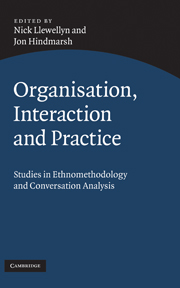Preface
Published online by Cambridge University Press: 20 May 2010
Summary
Soon after our studies began it was evident from the availability of empirical specifics that there exists a locally produced order of work's things; that they make up a massive domain of organisational phenomena; that classic studies of work, without remedy or alternate, depend upon the existence of these phenomena, make use of the domain, and ignore it.
(Garfinkel 1986: vii)When the term ‘organisation’ is used in common parlance, it is typically to label this or that place of work. People can say that an ‘organisation’ has acted in a certain way, that they have joined an ‘organisation’ or even that an ‘organisation’ has certain values. The term is clearly shorthand, a neat lexical gloss for something fairly complex and abstract. The minute we try to push the term analytically, things get quite complex. Does the term refer to an entity or a set of processes? Is it possible to say where an ‘organisation’ begins and ends? Is this a legal question or a matter of economic function? Is it a matter of where particular social and cultural boundaries lie?
These questions, concerning where organisations begin and end and with what material consequences, may seem purely theoretical in character, but they have practical counterparts. In different ways and towards different ends, everyone (at least tacitly) addresses these questions many times each day in the course of engaging with organisational members and settings. This is such a taken-for-granted feature of living in society that we often do not even notice.
Information
- Type
- Chapter
- Information
- Organisation, Interaction and PracticeStudies of Ethnomethodology and Conversation Analysis, pp. xi - xivPublisher: Cambridge University PressPrint publication year: 2010
